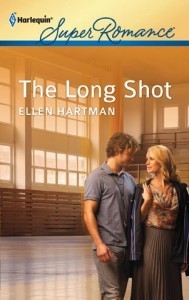Ellen Hartman is in the lair!
I’m thrilled to have Superromance author Ellen Hartman with us today! Her latest release, The Long Shot, is garnering rave reviews and is out now  (Pick up a copy. You won’t be disappointed!) Welcome, Ellen!
(Pick up a copy. You won’t be disappointed!) Welcome, Ellen!
What I Learned Playing Softball in the 70s
 In my May Superromance, The Long Shot, high school guidance counselor, Julia Bradley, bets that the girls’ basketball team she coaches will make the state tournament. The only problem is that Julia is a terrible coach.
In my May Superromance, The Long Shot, high school guidance counselor, Julia Bradley, bets that the girls’ basketball team she coaches will make the state tournament. The only problem is that Julia is a terrible coach.
I played softball in the 1970s, part of a generation of girls coached by moms who’d had limited exposure to organized sports.
Why did those particular women, most of whom didn’t have the faintest idea of how to coach, put their names down on the volunteer sheet? Did they dream about a league when they were kids, watching their brothers play? Did they want this athletic outlet for their daughters? How much of their decision was about baseball and how much was about wanting to fill a gap for the girls in their lives? I don’t know the answers to those questions, but I deeply I enjoyed thinking about them as I wrote Julia’s story.
My first baseball coach had a very pretty name, Mindy, and very pretty hands. She wore elastic waist shorts sized as-big-as-they-come. While she coached us, she chain-smoked, holding the cigarette daintily between painted nails, blowing smoke through tiny black teeth.
Mindy sent the shortest girls up to the plate with instructions not to swing. At anything. Those tiny girls, with a strike zone measured in inches, were more than likely going to draw a walk if they just stood at the plate long enough. Sure there was a bit of strategy involved, why waste a strike when a walk was guaranteed? But the underlying message was that some girls were too small or too delicate or too something to really play. Organized sports and ordinary girls were just starting to get to know each other.
One of the girls I played with “threw like a girl.” Her windup was the exact motion cartoon characters use to illustrate that insult: she’d fold her arm in half, elbow pointed at the ground, hand clutching the ball in front of her shoulder, and with a feminine little “oof,” she’d flip her wrist, sending the ball a whopping few feet. She started and ended her three-year baseball career unable to perform one of the basic tasks of baseball.
I was a skinny kid and not tall, but I loved playing catcher. The girls’ league didn’t have our own catcher’s equipment, so we used a set the boys had discarded. The chest protector hung down to my knees. The shin guards covered me from toes to hips. The helmet required two hands to drag off. I was barely mobile and never once caught a foul ball for an out. But at every opportunity I flung the helmet off and squinted at the sky, circling the plate, glove out hopefully, just in case.
My brother’ baseball uniform included a jersey with his team name printed on the back, a matching hat and socks, and long white baseball pants. Mine was a pair of polyester knit shorts, a polyester v-neck shirt, and a hat. I coveted my brother’s baseball pants, every week my hands itched to snatch them out of his laundry pile.
Our baseball league had two fields, one with a grass infield and groomed base paths, the other pure dirt and rocks. I remember standing at second base on the dirt field watching the boys’ game across the fence and wondering if ground balls would be easier to catch on smooth grass.
But I did love the game. My dad taught me to throw and hit and field grounders or fly balls. I learned the catcher’s art of psyching out the batter all on my own—I don’t think the term “trash talk” came into vogue until after I hung up my glove.
 I don’t remember learning much baseball from the women who coached me, but I absorbed lessons they maybe didn’t even know they were teaching. I learned about fostering opportunities. I learned about following a dream even if it doesn’t look like other people’s dreams, or even much like a dream at all. (Surely no one dreams of playing ball on a dirt field in polyester shorts surrounded by people who haven’t a clue what to do if the ball comes their way.) I learned to keep my head up in the face of a loss, to make do, but to keep an eye out for a way to trade up. I learned that expertise isn’t everything. Sometimes what matters is being willing to show up.
I don’t remember learning much baseball from the women who coached me, but I absorbed lessons they maybe didn’t even know they were teaching. I learned about fostering opportunities. I learned about following a dream even if it doesn’t look like other people’s dreams, or even much like a dream at all. (Surely no one dreams of playing ball on a dirt field in polyester shorts surrounded by people who haven’t a clue what to do if the ball comes their way.) I learned to keep my head up in the face of a loss, to make do, but to keep an eye out for a way to trade up. I learned that expertise isn’t everything. Sometimes what matters is being willing to show up.
In an early draft of The Long Shot, my editor penciled a question asking why Julia is the coach if she’s so terrible at the game. The book is set in a depressed town in upstate New York where the teachers at the high school are worn down. Julia coaches because no one else will. She cares.
Those women, the ones who showed up so our fledgling Little League softball teams could get off the ground, so the girls like me who wanted to play had a team, are the ones Julia Bradley is modeled on. She doesn’t know how to coach basketball, but she knows the team matters. She knows her girls matter and she’s doing what it takes to teach them to value themselves and their goals.
Being a sports hero isn’t always about winning. Sometimes the hero is the one who shows up.
What about you? Did you play sports? Coach? Have a favorite sports romance? I’d love to hear your stories.
Ellen’s giving away three copies of The Long Shot today!
And don’t forget to check out Ellen’s website at: http://www.ellenhartman.com/index.html



